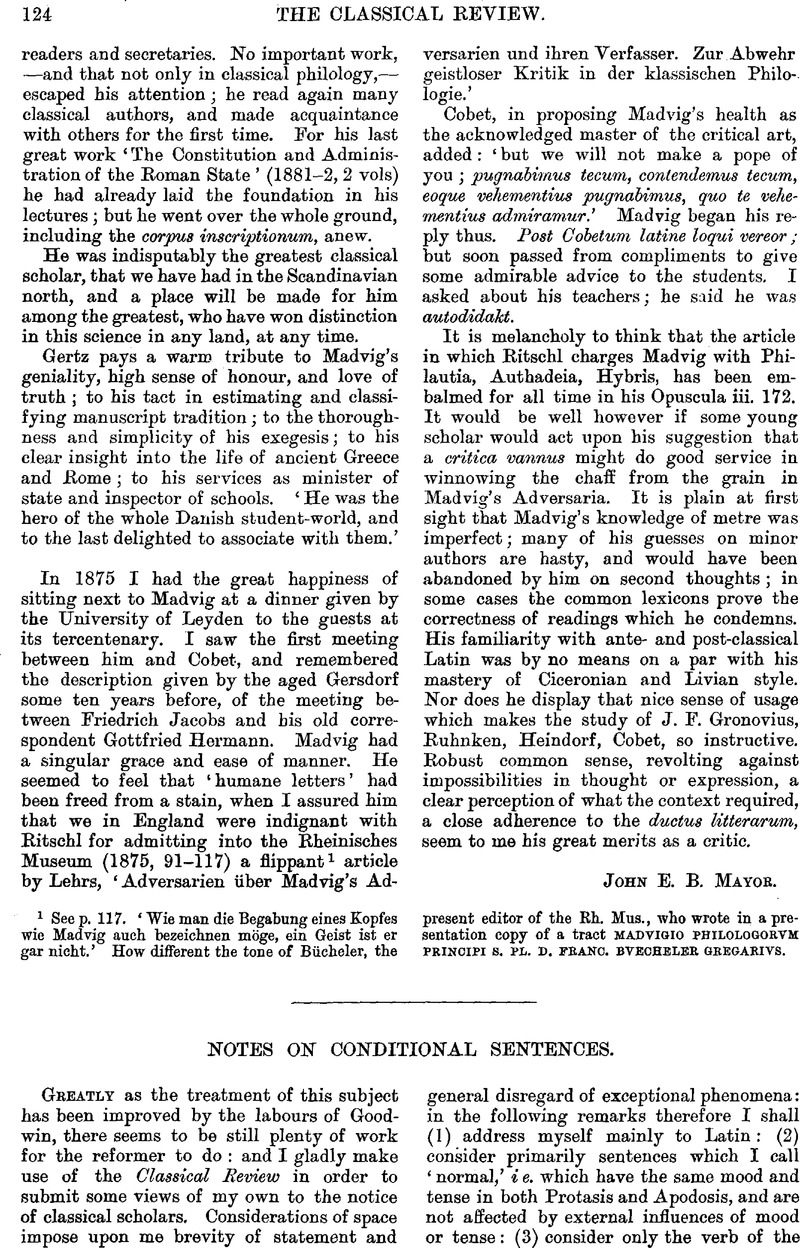No CrossRef data available.
Article contents
Notes on Conditional Sentences
Published online by Cambridge University Press: 27 October 2009
Abstract

Information
- Type
- Review Article
- Information
- Copyright
- Copyright © The Classical Association 1887
References
page 125 note 1 That the past tenses of the Indicative may be used to express unreality is maintained by Professor Priem of Posen in his learned paper in the Philologus (Supplem. V. 2, 1885): he quotes De Div. II. 127, ‘Deus si quidem nobis consulebat, “hoc facito, hoc ne feceris” diceret’ ibid. II. 20, etc. But he rightly regards such sentences as quite exceptional; in some of his passages (e.g. Pro Mil. § 28, Nat. Dear. III. 79, 80) I doubt whether we have genuine instances of the ‘Irrealer Fall.’ In the genuine instances we should have an exact analogy to the French ‘s'il était’ (= if he were), ‘s'il avait été’ (= wenn er gewesen wäre).
page 125 note 2 Mr. Eoby, however, must be excepted. In his larger grammar (§ 1497) he says ‘(In hypothetical sentences) the Subjunctive implies that the action spoken of is not a fact. Nothing is implied as to probability or improbability, possibility or impossibility, so far as the mood is concerned; but a non-real past action is of course impossible, a non-real future action is (apart from intrinsic impossibilities) possible.’
page 125 note 3 En passant I protest against the translation so commonly given ‘if he should do it, it would be well.’ I doubt if this combination of should and would is normal modern English, though it may be easily parallelled from Shakspere and is constant in certain suboblique constructions.
page 126 note 1 This method of treatment brings out the analogy between all tenses of the Subjunctive in conditional sentences. Strictly speaking all that is implied by the Imperfect and Pluperfect is mental reserve on the part of the speaker, reflecting upon the relation of his supposition to reality, but in past and present suppositions this reserve is tantamount to an implication of unreality : the future condition is necessarily undecided in regard to fulfilment. If any one is sceptical as to the possibility of the Present Subjunctive referring to the future, I would remind him of final and suboblique clauses and of the close similarity of form between the Future (Future Perfect) Indicative and Present (Perfect) Subjunctive in more than one conjugation.
page 126 note 2 That this may be translated in English ‘if I had not been Alexander’ etc. proves nothing as to a reference to the past. The utterance of Alexander necessarily refers to the moment when lie makes the acquaintance of D. We have here to deal with a peculiarity of English idiom.
page 127 note 1 Cf. Epist, II. 2, 145f. (cupis 148), Virg. Aen. XII. 810.
page 127 note 2 Mr. Reid says on § 13 : ‘it does not often happen that the Apodosis has a verb in the Pluperfect, while the verb of the Protasis stands in the Imperfect.’ I have however noted in the five books above referred to seven instances : Cat. i. 12, 29; ii. 2, 3 : Pro Sest. 45; Pro Mur. § 8, § 17, § 46; Pro Arch. § 16. A large number are given by Priem (pp. 264f.)

